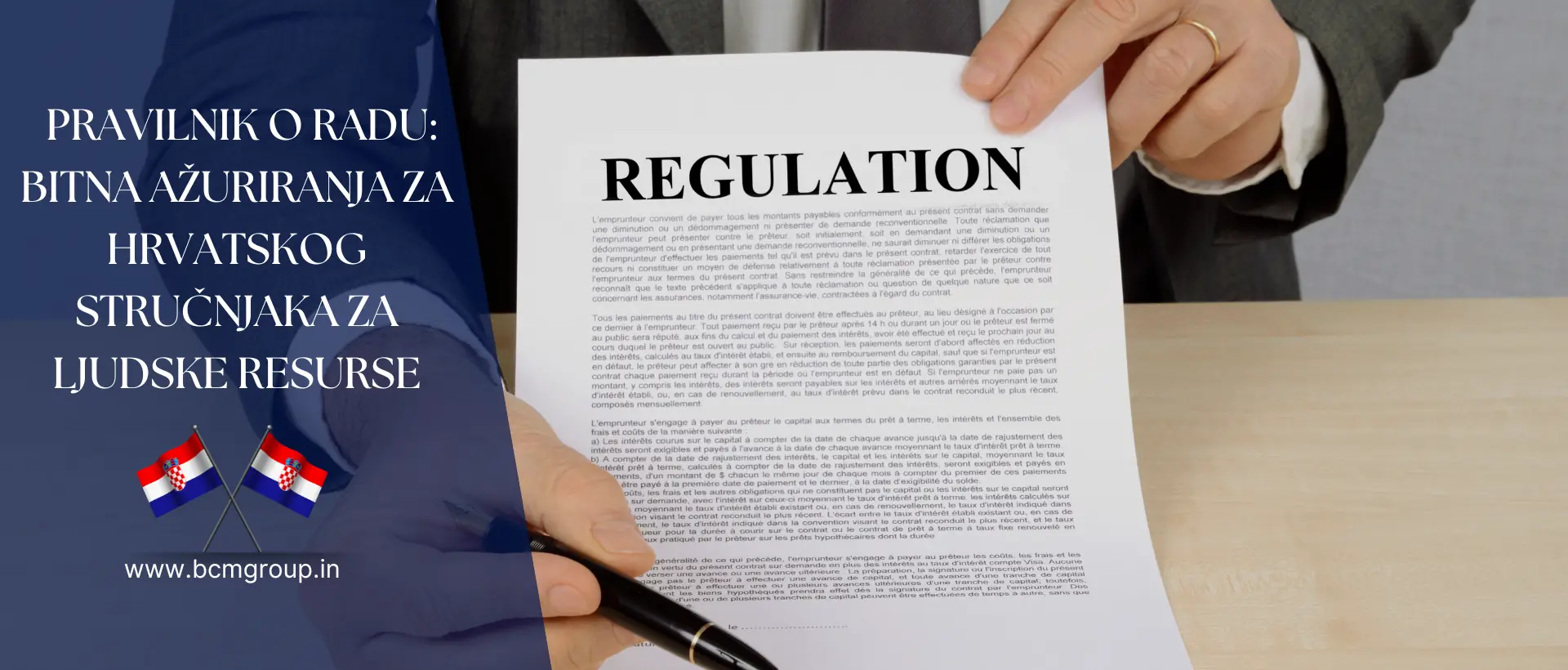
Nedavno je opće okruženje Pravilnik o radu prošlo kroz određene promjene u Hrvatskoj, što znači da je ovo područje o kojem se trebaju informirati HR stručnjaci i vođe organizacija. Sve ove ažurirane informacije su obvezne za poznati HR regrutere, menadžere zapošljavanja i izvršne direktore, a također imaju značajan pravni aspekt; ostali bitni ciljevi uključuju stvaranje povoljnog radnog okruženja i izbjegavanje najgore mogućnosti.
U ovom blogu, fokus će biti na najnovijim promjenama u hrvatskom Pravilnik o radu i Pravilnik o radu zaštiti na radu za mjesta rada, te zašto ih vrijedi podijeliti s HR profesionalcima i poslovnim liderima.
Kako rad od kuće ili na daljinu dobiva sve više podrške u mnogim organizacijama, Hrvatska je usvojila nove politike za upravljanje ovom vrstom zaposlenja. Ažurirano radno pravo/zakon o radu naglašava specifične kriterije za aranžmane rada na daljinu:
Poslodavac je sada dužan sastaviti pisani ugovor o obavljanju rada s remote radnikom koji uključuje radno vrijeme, dužnosti i plaću.
Sigurnost podataka je stoga svetinja, a poslodavci moraju jasno definirati kako IT, komunikacija/dijeljenje podataka i privatnost, posebno u aranžmanima rada na daljinu.
Promjene napravljene u zakonu imale su za cilj zaštitu interesa poslodavaca uz istovremeno služenje pravima zaposlenika, što zahtijeva od voditelja ljudskih resursa da razviju praktične politike koje bi se bavile novim promjenama.
Istraživanje koje je provela Hrvatska gospodarska komora 2023. godine otkrilo je da je 68% tvrtki uvelo rad na daljinu u svoj radni model, dok je 45% uvelo hibridne modele.
Promjena u zahtjevima minimalna plaća uspostavljena je kako bi odražavala razinu europskog standarda blagostanja zaposlenika u gospodarstvo hrvatske. Povećanje minimalnih plaća koje su usklađene s kupovnom moći radnika vrši se postupno, počevši od siječnja 2024.
Zakonska federalna minimalna plaća za zapošljavanje povećana je na 4500 HRK za zaposlene s punim radnim vremenom, što je povećanje s 4200 HRK u prethodnoj godini, što iznosi povećanje od 7%.
To je problem za odjele ljudskih resursa da ponovo uravnoteže proračune plaća i naprave odgovarajuće promjene u plaćama za uloge na početnim razinama organizacija kako bi odgovarale zakonskim specifikacijama.
Ovaj porast usklađen je s planovima gospodarskog razvoja Hrvatske i potrebama ljudskih resursa kako bi se osiguralo da promjene naknada redovito odgovaraju novim minimalnim zakonskim zahtjevima.
Prema Ministarstvu financija Hrvatske, povećanje plaća moglo bi utjecati na do 25% zaposlenika, posebno onih u sektoru usluga, uključujući restorane i trgovine.
Hrvatska vlada također je uvela nove mjere zaštite radnika kao znak promicanja aspekta zdravlja, sigurnosti i pravednog postupanja na radnom mjestu.
Politike su sada ostvarene da ponude roditeljima fleksibilniji, liberalniji i duži dopust kada je u pitanju trajanje dopusta.
Najnovije regulative usmjeravaju pažnju na oštrije mjere protiv diskriminacije, uključujući obuku osoblja i informacijske kampanje.
Sada je vrijeme za stručnjake za ljudske resurse da ponovno razmotre organizacijske prakse vezane uz sigurnost, raznolikost i obiteljska pitanja kako bi osigurali da su u skladu s smjernicama. Sve ove mjere igraju ključnu ulogu u stvaranju profesionalnog odnosa bez uznemiravanja i jednakosti na radnom mjestu, što pomaže u izbjegavanju troškova parnica i poboljšava fluktuaciju zaposlenika.
Statistike Zavoda za javno zdravstvo Hrvatske sugeriraju da bolja prava radnika mogu dovesti do smanjenja godišnje fluktuacije zaposlenika u sektorima povezanim s povećanim zdravstvenim rizicima za 12%.
Druge mjere također su bile usmjerene na poboljšanje ravnoteže između poslovnog i privatnog života u obnovljenom hrvatskom radnom pravu: radno vrijeme i prekovremeni rad su razlikovani. Ključne promjene uključuju:
Iako je broj sati koje jedan može raditi prekovremeno reguliran, svi dodatni radni sati iznad 180 sati godišnje mogu se dopustiti samo prema kolektivnom ugovoru.
Vlasnici poslodavaca su dužni osigurati da radnici razumiju pravo vrijeme za odmor te osigurati onima koji rade duge sate, poput onih u zdravstvenom sektoru ili proizvodnim tvrtkama, da imaju određeno vrijeme za odmor.
HR timovi moraju preispitati postojeće politike radnog vremena i osigurati da se ti odmori i ograničenja radnog vremena poštuju. Mjere ove vrste ne samo da imaju preventivnu svrhu, već također poboljšavaju radne uvjete u organizacijama.
Prema znanstvenicima, korištenje reguliranih pauza može čak poboljšati produktivnost za do 15%, prema nalazima Hrvatskog zavoda za zapošljavanje.
Regulirajući smjernice EU-a, Hrvatska postupno promiče programe razvoja vještina kako bi stvorila bolje kvalificiranu populaciju. U tom procesu, hrvatskim poslodavcima je sada dopušteno pružati kontinuirano stručno obrazovanje.
Također je otkriveno da tvrtke koje se bave usavršavanjem svojih radnika mogu biti također kvalificirane za državne poticaje i porezne olakšice.
Kako bi se zadržala prisutnost vatrozida za potrebne pozadinske provjere u industrijama kao što su IT, financije i zdravstvena zaštita, trebala bi se preporučiti obavezna specijalizirana trening predavanja koja se fokusiraju na usklađenost s novim propisima.
Ova direktiva ne samo da ima pozitivne posljedice za zaposlenike, već također ima pozitivan utjecaj na rast organizacije, što čini organizacije najpoželjnijima. Iskustva i nove činjenice također sugeriraju da bi takve koristi trebale biti iskorištene od strane odjela ljudskih resursa traženjem financijskih prilika za programe stručnog usavršavanja.
Praćenje Pravilnik o radu u Hrvatskoj ključno je kako bi stručnjaci za ljudske resurse kao i drugi poslovni rukovoditelji mogli biti u toku s promjenama, osiguravajući pritom da je snaga na strani organizacije, radne snage i općeg radnog okruženja. Povećanje plaća niti rješavanje s udaljenim Pravilnik o radu nisu pasivne aktivnosti; te nedavne promjene nisu iznimka. Stoga, najbolje prakse u upravljanju ljudskim resursima, politikama, komunikacijom i vještinama mogu biti dodatne strategije uspjeha za menadžere ljudskih resursa i izvršne direktore u njihovim organizacijama te spriječiti negativan utjecaj promjene regulativa.
Ove promjene su potrebne kako bi se održavala usklađenost s stalno poboljšavajućim zakonima o radu u Hrvatskoj i kako bi se razvila jaka i prilagodljiva populacija za buduće gospodarstvo zemlje.
Ako ste industrija koja traži stručne strane radnike, možete nas kontaktirati. Mi smo agencija za zapošljavanje stranaca koja pruža kvalitetnu radnu snagu iz Indije europskim zemljama.
Zapovjedništvo
409, 4. kat, Amanora Chambers, trgovački centar Amanora, blizu grada Magarpatta, Hadapsar, Pune – 411028
BCM Group Global Manpower SRL, Roomania
Za tražitelje posla
Za tvrtke
Za tvrtke

Registered under Ministry of External Affairs
License No. MUMBAI/PARTNERSHIP/5493853/2021
© 2024–2025 bcmgroup. Sva prava pridržana.
Ova stranica je zaštićena reCAPTCHA-om i primjenjuju se Googleova Pravila o privatnosti i Uvjeti pružanja usluge.